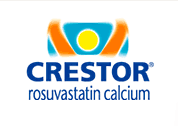Crestor
Rosuvastatin is a member of the drug class of statins, used to treat hypercholesterolemia and related conditions, and to prevent cardiovascular disease. It is currently being marketed by the pharmaceutical company AstraZeneca as Crestor®. more...
Presentation
Rosuvastatin is available as Crestor in tablet form (5, 10, 20, or 40 mg) for oral administration. Tablets are pink, round or oval (40 mg), biconvex, film-coated, and imprinted with "ZD4522" and tablet strength. Japanese approval is in the dose range of 2.5 mg to 20 mg; therefore, smaller dose tablet forms might also be available outside the United States. Note that 97% of worldwide sales have been at or below the 20 mg dose.
Mechanism of action
See the article on statins for more details.
Rosuvastatin is a competitive inhibitor of the enzyme HMG-CoA reductase, having a mechanism of action similar to other statins.
Indications and regulation
Rosuvastatin is indicated for the treatment of elevated LDL cholesterol (dyslipidemia), total cholesterol (hypercholesterolemia) and/or triglycerides (hypertriglyceridemia).
As of 2004, rosuvastatin had been approved in 67 countries and launched in 56. Approval in the United States by the FDA came on August 12, 2003.
Marketing and competition
Marketing
The drug was billed as a super-statin during its clinical development, claimed to offer a high potency and improved cholesterol reduction compared to rivals in the class. Currently the main competition for Crestor is Vytorin by Merck & Co. (a combination of simvastatin (Zocor) and ezetimibe (Zetia)); unfortunately, there are no published studies showing which of the two drugs is more effective.
First launched in 2003, sales were $129 million and $908 million in 2003 and 2004, respectively, with a total patient treatment population of >4 million by the end of 2004.
Debate & Criticisms
Several months after its introduction in Europe, Richard Horton, the editor of the medical journal The Lancet, criticised the way Crestor had been introduced. "AstraZeneca's tactics in marketing its cholesterol-lowering drug, rosuvastatin, raise disturbing questions about how drugs enter clinical practice and what measures exist to protect patients from inadequately investigated medicines," according to his editorial. The Lancet's editorial position is that the data for Crestor’s superiority relies too much on extrapolation from the lipid profile data and too little on hard clinical endpoints, which are available for other statins. The manufacturer responded by claiming that few drugs had been tested so successfully on so many patients. In correspondence published in The Lancet, AstraZeneca's CEO Sir Tom McKillop called the editorial "flawed and incorrect" and slammed the journal for making "such an outrageous critique of a serious, well-studied medicine."
Read more at Wikipedia.org




